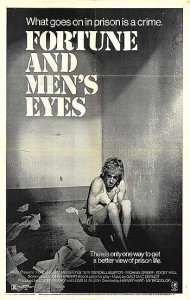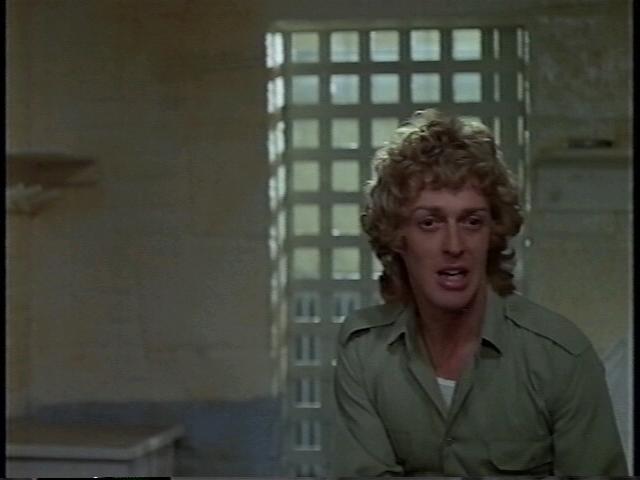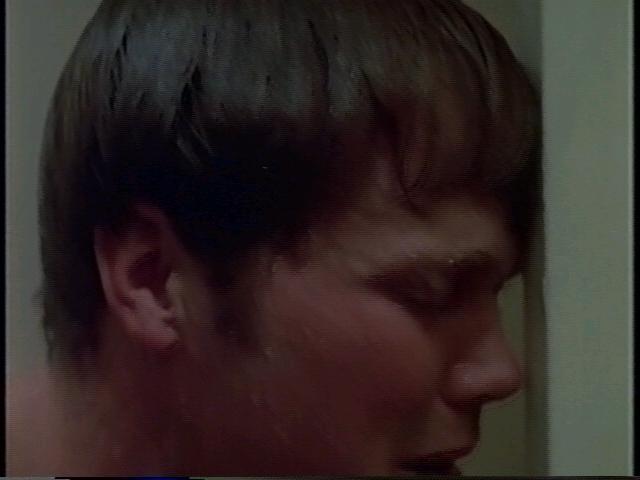Fortune and Men’s Eyes (1971)
“Ain’t nobody gonna mess with a man getting his oats.”
|
Synopsis: |
|
Genres:
Review: Equally frustrating is the characterization of Rocky, who plays a pivotal role in the film: while Hall gives a decent performance, his character is so poorly written that it’s hard to understand his motivations. He could perhaps be seen as psychopathic in his vacillation between friendship with Burton and bullying domination, but this is never made clear. On the other hand, while some have argued that a character like Queenie (Greer gives a wonderfully vibrant performance) would never be able to hold such a high position in a male-dominated prison, I disagree: in an isolated world where sex is everything, a brash, self-confident man who willingly takes on the role of a woman (and flaunts his sexuality) may very well be able to thrive. * Update 2/1/21: Having spent the past few years volunteering in a local men’s prison (and learning more about what daily life is like for them), everything about this movie now rings true — including this terrible but no longer incomprehensible scene. Redeeming Qualities and Moments:
Must See? Links: |



One thought on “Fortune and Men’s Eyes (1971)”
A must. Something of a forgotten film, it seems, which nevertheless has a firm place in gay cinema history.
~which is odd, in a way, since it’s mainly ‘a gay film’ by a certain definition: there’s gay sex in it and at least two prominent characters are homosexual. But the sex in the film is clearly connected to the need for dominance, power games and female substitution; the reality of a few actual gay characters in the mix almost seems peripheral to the point.
To a certain degree, we’ll have to take writer John Herbert at his word; he wrote this as a result of his own stint behind bars (the ‘Mona’ character speaking for him). The stage version (directed by Sal Mineo) was a huge hit and the play was taken all over the world and used as a catalyst for prison reform. The film certainly is ground-breaking for showing some of what can really happen (in terms of sex) when men are penned in together. (In years of films about men in prison, we were never supposed to even think the guys would try for some kind of sexual release, esp. with other men; yet, oddly, that reality often showed up in films about imprisoned women. ‘Caged’, anyone?)
‘Fortune and Men’s Eyes’ (an inspired title) is rather potent stuff. And, overall, Harvey Hart’s direction is impressive. It’s certainly not easy ‘opening up’ a film that takes place completely behind walls.
I thought at first that ‘Hair’ and ‘Two Gentlemen of Verona’ composer Galt MacDermot’s score might be too ‘up’ for a film of this sort but, later, it seemed to give the film a needed tone break as a balance. (MacDermot had, of course, set Shakespeare to music before in ‘Hair’, with ‘What A Piece Of Work Is Man’.)
Burton (now a minister!) makes an interesting, somewhat courageous about-face from his role in ‘The Sterile Cuckoo’. And Hall (whose character I actually buy completely) and Freedman (esp. good in his final scene with Burton) are equally effective, I think.
But this is Michael Greer’s movie! An intriguing personality at this pivotal point in gay cinema, Greer claimed early on that he was not sure (or, apparently, interested in) whether he was hetero or gay: he had tried both. (I don’t know what he later maintained; there is a tribute page for him on Facebook.) He played straight in ‘The Magic Garden of Stanley Sweetheart’, rather adorably gay in ‘The Gay Deceivers’ – and just the opposite in ‘Fortune’. His performance in ‘Fortune’, in particular, is deceptively one-level; other levels can appear with a second viewing. (And he ad-libbed or wrote a good deal of the dialogue himself.)
Sidenote: This will have to wait til I post on ‘The Rocky Horror Picture Show’, but it’s interesting to come across films which may very well have influenced its creator Richard O’Brien. (I noticed what seems a marked influence of the B-film ‘You’ve Ruined Me, Eddie’, for example.) Frank N. Furter appears to me to be a combo of Queenie AND Rocky, and Frank’s creation (who doesn’t speak) seems to have been left with just the studly physical quality the Rocky in ‘Fortune’ has. As well, Queenie’s star turn during the Christmas show is not that far removed from the floor show in ‘TRHPS’.